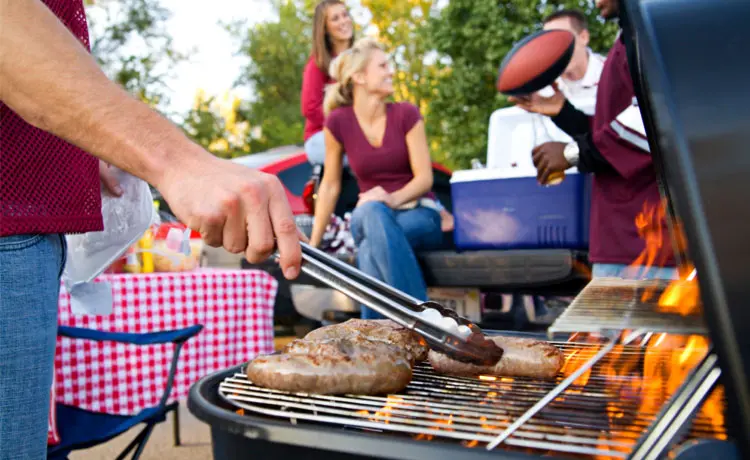The delicious smell of grilling that wafts through the neighborhood is a true sign that summer has arrived. However, every year grills are responsible for numerous house fires, thousands of burn injuries and even some deaths.
Something that’s supposed to be a fun way to cook supper should never become a hazard for family members. Help the people in your community learn about grilling safely with these simple protective steps.
Get Your Gas Grill Going
Preparing to use your grill:- Each year, before you use the grill for the first time, there’s an easy way to test the line from the gas cylinder for leaks: Mix up a solution of soapy water and apply it to the line. Turn on the gas. If bubbles appear, there’s a leak – immediately turn off the gas. If gas continues to leak, call your local fire department. Otherwise, get the line repaired before you use the grill.
- Make sure your grill is placed a good distance from anything that can burn – such as the wall of your house, the deck railing, bushes or tree branches – and not under your house’s eaves.
- Clean the grills and the tray underneath.
- With the lid open, turn on the gas.
- Turn on one of the grill’s burners.
- Push the ignition button. If the grill doesn’t start, turn off both the gas and the burners and wait at least 5 minutes for the gas to dissipate before igniting the grill again.
Did you know? 20% of fires are caused by grease or fat on the grills.When you’re finished grilling, follow the safe sequence for shutdown: Turn off the gas first, then turn off the burners.
Safety Tips for Charcoal Grills
For a grill that uses charcoal or other type of solid fuel:- Set it up at least 3 feet away from your house, porch, shed, trees or bushes – anything that could be flammable.
- Clean the grill to remove grease or fat.
- Use starter fluid intended for barbecue grills. Follow the product's instructions about how to apply and light it, and don’t squirt more fluid on after you’ve already tried to start the fire. Store the fluid safely, away from heat sources and where children can’t access it.
Keep Up Your Guard While Grilling
- Always have someone attending to the grill.
- Make sure children and pets don’t come within 3 feet of the grill – both while you’re cooking and after, while the grill is still hot or as long as there are hot coals.
- Don’t lean over the grill – use tools with long handles to keep yourself well away from the heat.
- If you smell gas while you’re cooking on a gas grill, move away from the grill and call the fire department right away.
Food Poisoning Is No Fun!
Keep in mind some basic rules of food safety:- Wash your hands and work surfaces after handling raw meat or fish.
- Keep meat and fish cold – in your fridge or a cooler – until you’re ready to put it on the grill.
- Clean the grilling surface and preheat it for 15-20 minutes before grilling.
- Make sure meat and fish are thoroughly cooked.
Suggestion: Invest in a good-quality meat thermometer.
- Use a fresh plate for the cooked product.
